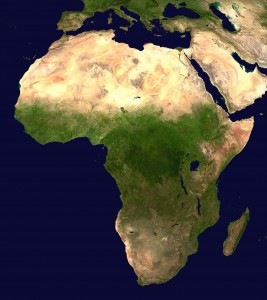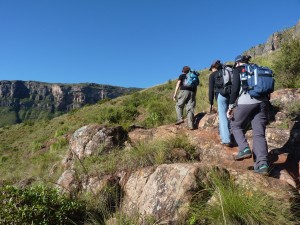Although the Kenyan government has been going to great lengths to ensure that all children are provided with free primary education, many young people are unable to attend on a regular ![By Kai Breker (German wikipedia) [GFDL (http://www.gnu.org/copyleft/fdl.html) or CC-BY-SA-3.0-2.5-2.0-1.0 (http://creativecommons.org/licenses/by-sa/3.0)], via Wikimedia Commons Tunde Folawiyo](http://upload.wikimedia.org/wikipedia/commons/2/2d/Rift_Valley.jpg) basis. Approximately 83% are enrolled, but only a fraction of these go to school every day. Particularly in remote areas such as Bartabwa, the challenging conditions which many families find themselves in make it difficult to prioritise schooling.
basis. Approximately 83% are enrolled, but only a fraction of these go to school every day. Particularly in remote areas such as Bartabwa, the challenging conditions which many families find themselves in make it difficult to prioritise schooling.
However, a number of young DofE participants in Kenya have been doing their best to rectify this situation. Tunde Folawiyo, and others who are familiar with the DofE, may know of Rachel Wanjohi; for the Services section of her Gold Award, Rachel decided to encourage children in Wairuri to attend their local primary school. After visiting the school, she saw that a lack of basic facilities, such as a library, sports equipment, first aid kits and clean water had deterred many parents from sending their children there.
Rachel launched a number of fundraising projects to address these problems; her initial efforts helped to raise KES30,000, which was then used to purchase a water tank. Further fundraising work brought in even more money, and gradually, as the school facilities improved, attendance rates began to increase. Rachel’s work vastly improved the quality of life for many children in the local area and, of course, also helped her to achieve her Gold Award. Since then, she has gone on to work as Kenya’s Ambassador for Tunza Eco-Generation, and now aims to promote the eco-friendly initiatives being organised around Africa.
Judy Chesire is another former DofE participant whose work had an enormously positive impact on the education system in Kenya. For the Services section of her Award, she decided to set up a programme called Education and Life Empowerment in the afore-mentioned area of Bartabwa. She started off by arranging motivational talks, during which she and other guest speakers discussed the importance of education.
She then addressed the issue of staff shortages in the local school, by enlisting the help of her fellow university students, who were able to fill in as substitute teachers when necessary. In addition to this, she encouraged local children to see school in a different light, by making learning more enjoyable for them; she organised music and PE lessons, as well as games that helped children to view education as fun, rather than as a chore. As a result, both attendance rates and grade averages have risen dramatically in Bartabwa.
Chesire’s work led to her being recognised by the Peter Cruddas Social Innovation Initiative, and attending a showcase for the foundation in London. Anyone who is familiar with the Peter Cruddas Foundation, like Tunde Folawiyo, will understand what an honour it is to be asked to participate in this type of event.

 people achieve their potential throughout the world. In no other region has this been more apparent than in the continent of Africa.
people achieve their potential throughout the world. In no other region has this been more apparent than in the continent of Africa.![By Staff Sgt. Ashely Moreno [Public domain], via Wikimedia Commons Tunde Folawiyo](http://www.tundefolawiyo.co.uk/wp-content/uploads/2014/09/handcuff.jpg) their sentences. This supports the rehabilitation process, as it gives them a sense of achievement, builds their self-esteem, and provides them with practical skills which will allow them to make better choices after they are released.
their sentences. This supports the rehabilitation process, as it gives them a sense of achievement, builds their self-esteem, and provides them with practical skills which will allow them to make better choices after they are released. Almost 200 million people in Africa today are between the ages of 15 and 24, giving the country the youngest population in the world. This massive demographic segment of the population is largely overlooked as a potential source for positive change in African society and is often left without the education and training they need to improve their lives and those in their communities. TEACH (Time to Empower Africa’s Children), a nonprofit, charitable organisation, is endeavoring to alleviate poverty in Africa through the power of education and the engagement of new skills. One of the ways the organisation does this is by partnering with the youth of the UK, through the Duke of Edinburgh’s Award (DofE) programme, offering volunteer opportunities for them to help empower African youth, while meeting the criteria for the DofE Award.
Almost 200 million people in Africa today are between the ages of 15 and 24, giving the country the youngest population in the world. This massive demographic segment of the population is largely overlooked as a potential source for positive change in African society and is often left without the education and training they need to improve their lives and those in their communities. TEACH (Time to Empower Africa’s Children), a nonprofit, charitable organisation, is endeavoring to alleviate poverty in Africa through the power of education and the engagement of new skills. One of the ways the organisation does this is by partnering with the youth of the UK, through the Duke of Edinburgh’s Award (DofE) programme, offering volunteer opportunities for them to help empower African youth, while meeting the criteria for the DofE Award. In keeping true to its commitment to provide a beneficial experience for the millions of youth participating in its programme worldwide, the DofE continues to implement new strategies to bring forth great opportunity for participants. The digital platform will hold a variety of unique tools to make the DofE process simpler for both students and facilitators alike. The platform will boast a Record Book to replace paper records, making it possible for participants to easily document their progress. Currently, the online programme is being used by DofE members across countries like Canada, Australia, Kenya, France, India and the United States.
In keeping true to its commitment to provide a beneficial experience for the millions of youth participating in its programme worldwide, the DofE continues to implement new strategies to bring forth great opportunity for participants. The digital platform will hold a variety of unique tools to make the DofE process simpler for both students and facilitators alike. The platform will boast a Record Book to replace paper records, making it possible for participants to easily document their progress. Currently, the online programme is being used by DofE members across countries like Canada, Australia, Kenya, France, India and the United States. The organisation was first spearheaded by HRH The Duke of Edinburgh as a programme for boys. Consisting of four segments – rescue, expeditions, public service and fitness – the programme sought to provide a stable environment for young boys to acquire vital life skills to aid in their progression toward adulthood. By 1957, over 7,000 boys had begun DofE programmes, with one thousand Awards achieved since its establishment. One year later, the DofE for Girls is established, focusing on the areas of living, interests, adventures and services. The programme’s first Gold Award was presented at the famed Buckingham Palace. During this same year, pilot projects were initiated in eleven other Commonwealth nations.
The organisation was first spearheaded by HRH The Duke of Edinburgh as a programme for boys. Consisting of four segments – rescue, expeditions, public service and fitness – the programme sought to provide a stable environment for young boys to acquire vital life skills to aid in their progression toward adulthood. By 1957, over 7,000 boys had begun DofE programmes, with one thousand Awards achieved since its establishment. One year later, the DofE for Girls is established, focusing on the areas of living, interests, adventures and services. The programme’s first Gold Award was presented at the famed Buckingham Palace. During this same year, pilot projects were initiated in eleven other Commonwealth nations.![By Claudio Allia (Own work) [CC-BY-SA-3.0 (http://creativecommons.org/licenses/by-sa/3.0) or GFDL (http://www.gnu.org/copyleft/fdl.html)], via Wikimedia Commons Tunde Folawiyo](http://upload.wikimedia.org/wikipedia/commons/thumb/c/c9/MathareValleySlum.jpg/256px-MathareValleySlum.jpg) The Duke of Edinburgh Award has changed the lives of millions of young people for the better, and none more than Kenyan, Julius Irungu Krush, who grew up in the slums of Mathare. The makeshift shelters have no electricity; no running water; no sanitation. Julius and his family were under constant threat – both from opportunist crime and their exposure to the elements. Julius is the youngest son of a single mother who had three other children to care for. Schooling fees and learning materials slid from Julius’s grasp as his mother struggled to put food on the table.
The Duke of Edinburgh Award has changed the lives of millions of young people for the better, and none more than Kenyan, Julius Irungu Krush, who grew up in the slums of Mathare. The makeshift shelters have no electricity; no running water; no sanitation. Julius and his family were under constant threat – both from opportunist crime and their exposure to the elements. Julius is the youngest son of a single mother who had three other children to care for. Schooling fees and learning materials slid from Julius’s grasp as his mother struggled to put food on the table. Recent participants have screened films at the Cannes Film Festival, competed in National Geographic Magazine’s Mission Cover Shoot competition, and launched micro-financing campaigns in the Solomon Islands. In 2013, the Duke of Edinburgh charity showed a ten percent increase in new participants, and over one hundred thousand Duke of Edinburgh awards were earned in the UK. The number of global participants is currently tallied at 850,000, with over 8 million total participants in the programme’s fifty-eight year history.
Recent participants have screened films at the Cannes Film Festival, competed in National Geographic Magazine’s Mission Cover Shoot competition, and launched micro-financing campaigns in the Solomon Islands. In 2013, the Duke of Edinburgh charity showed a ten percent increase in new participants, and over one hundred thousand Duke of Edinburgh awards were earned in the UK. The number of global participants is currently tallied at 850,000, with over 8 million total participants in the programme’s fifty-eight year history.![By Paliano (Own work) [Public domain], via Wikimedia Commons Tunde Folawiyo](http://upload.wikimedia.org/wikipedia/commons/thumb/d/d2/Prince_Phillip_of_Edinburgh.jpg/256px-Prince_Phillip_of_Edinburgh.jpg) With a history spanning over fifty years, the Duke of Edinburgh Award programme has affected the lives of countless youths in the UK and around the world. The programme, commonly called DofE, was started by Prince Philip, Duke of Edinburgh. To counteract the modern social forces, described by German educator Kurt Hahn, that were making young adults less imaginative, adventurous, and socially minded, the DofE encourages participants to achieve goals in five categories: volunteer work, physical activity, practical skills, adventurous journey, and a residential category that requires participants to live away from home.
With a history spanning over fifty years, the Duke of Edinburgh Award programme has affected the lives of countless youths in the UK and around the world. The programme, commonly called DofE, was started by Prince Philip, Duke of Edinburgh. To counteract the modern social forces, described by German educator Kurt Hahn, that were making young adults less imaginative, adventurous, and socially minded, the DofE encourages participants to achieve goals in five categories: volunteer work, physical activity, practical skills, adventurous journey, and a residential category that requires participants to live away from home.![By Diliff (Own work) [GFDL (http://www.gnu.org/copyleft/fdl.html), CC-BY-SA-3.0 (http://creativecommons.org/licenses/by-sa/3.0/) or CC-BY-2.5 (http://creativecommons.org/licenses/by/2.5)], via Wikimedia Commons Tunde Folawiyo](http://upload.wikimedia.org/wikipedia/commons/thumb/8/8f/Windsor_Castle_at_Sunset_-_Nov_2006.jpg/256px-Windsor_Castle_at_Sunset_-_Nov_2006.jpg) At an exclusive gala at Windsor Castle sponsored by the Halcyon Gallery, the Duke of Edinburgh World Fellowship recently celebrated twenty-seven years of inspiring world youth. From its founding in the UK, it since has spread in various versions to 140 additional countries. Young people worldwide are participating in the program, and community leaders, in business, politics and education, are doing their part to support the programme globally. Supporters of the Duke of Edinburgh Award are dedicated to the enrichment of young people, including Tunde Folawiyo. Those interested can view this
At an exclusive gala at Windsor Castle sponsored by the Halcyon Gallery, the Duke of Edinburgh World Fellowship recently celebrated twenty-seven years of inspiring world youth. From its founding in the UK, it since has spread in various versions to 140 additional countries. Young people worldwide are participating in the program, and community leaders, in business, politics and education, are doing their part to support the programme globally. Supporters of the Duke of Edinburgh Award are dedicated to the enrichment of young people, including Tunde Folawiyo. Those interested can view this